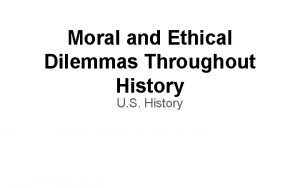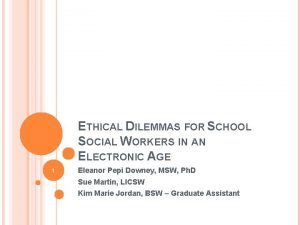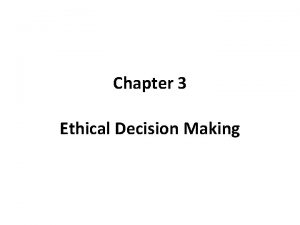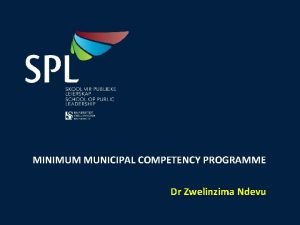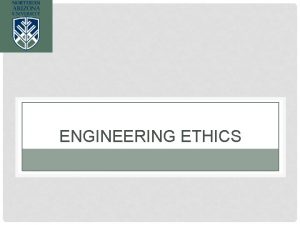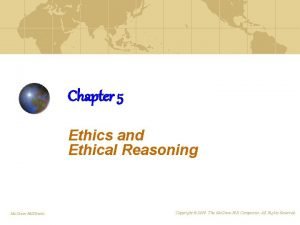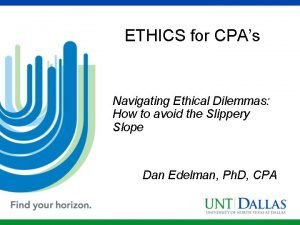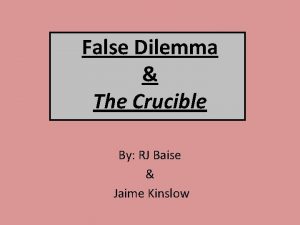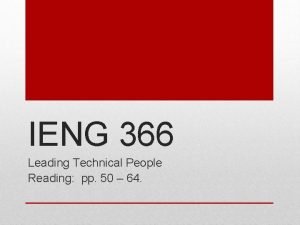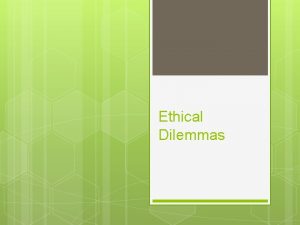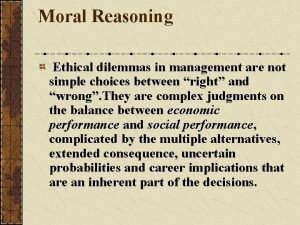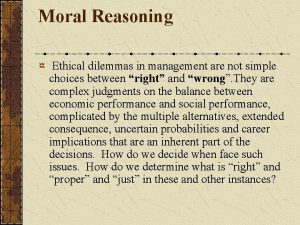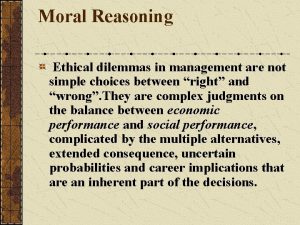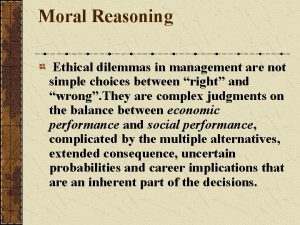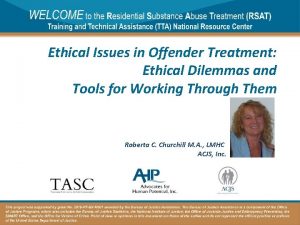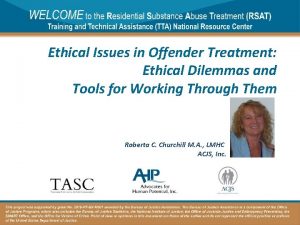Moral and Ethical Dilemmas Throughout History U S









- Slides: 9

Moral and Ethical Dilemmas Throughout History U. S. History

What are we talking about? • • What is a moral/ethical dilemma? In your own words, write down what you think a moral dilemma is. List any dilemmas presidents have faced in the past. What makes these decisions moral/ethical dilemmas • Dilemma: • a situation in which a difficult choice has to be made between two or more alternatives, especially equally undesirable ones. • Moral: • concerned with the principles of right and wrong behavior and the goodness or badness of human character • Ethical: • being in accordance with the rules or standards for right conduct or practice, especially the standards of a profession

Japanese Internment Camps • After the attack on Pearl Harbor, Japanese Americans were moved from their homes to internment camps. • Many families had been in America for several generations and identified more with their American heritage than their Japanese heritage. • • What was the reason behind the internment camps? Explain how this is a moral dilemma?

Atomic Bomb ➔ August 1945 ◆ WWII in Europe has ended but the war in the Pacific is still raging. ● Hundreds of thousands of Americans have died in the Pacific theater alone. ◆ President Roosevelt died in April leaving Vice President Truman in power. ● Having only recently learned of the Manhattan Project, he must make one of the biggest decisions any president will ever have to make. Will he drop atomic bombs on Japan or not? Explain how this is a moral/ethical dilemma. List the postitives and negatives of dropping atomic bombs on Japan. What would you have chosen? Why?

Pol-Pot Take Over ➔ Communist leader Pol-Pot took over Cambodia. Pol-Pot ordered the execution of all intellectuals. ● Doctors, lawyers, teachers, business owners. ● Anyone with glasses or good dental work. ● 2 million people were killed from ‘ 75 -’ 79 ◆ CIA warned it would happen ● We had already been fighting in Vietnam ◆ ○ ○ ● Nixon had resigned Congress had withdrawn funding for all wars in Southeast Asia. United States didn’t intervene. Explain the moral dilemmas facing the U. S in regards to the genocide in Cambodia. Why do you think a Communist leader would target intellecutals.

Kent State University -- Kent, Ohio ➔ Students were protesting the Vietnam War ◆ Protests had been turning into riots ◆ The National Guard were sent in for riot control. ● They were provided live ammunition but weren’t trained for crowd control. ◆ Four students were killed. ● Jeffrey Miller (20) ● Allison Krause (19) ● William Knox Schroeder (19) ● Sandra Lee Scheuer (20) What sort of ethical dilemmas do you think this caused? Put yourself in the soldiers position. What would you have done?

Watergate ➔ Committee to Re-elect the President (CREEP) was caught sneaking into the DNC headquarters at the Watergate Hotel in D. C. ◆ Nixon’s people paid off the burglars and anyone that might go to jail to protect the White House. ● He also tape recorded all conversations in the Oval Office. ○ He refused to give up the tapes. ○ Nixon felt that the president above the law. ◆ “When the president does it, it’s not illegal. ” ○ He ended up resigning. ◆ He would be pardoned by Ford. What limitations does the Constitution set for Presidents? Explain the moral and ethical issues within the Watergate scandal.

Iran-Contra ➔ President Reagan ➔ Congress made it illegal to sell weapons to Iran due to the Iranian hostage situation ◆ American students were kidnapped in Iran. ➔ Reagan wanted to sell weapons to Iran ◆ The $$ would go to the Nicaraguan Contras. ● The Contras were an anti-Communist group in Nicaragua. ○ President Reagan was hoping to quell the spread of Communism. What are the biggest dilemmas for the president in this situation? Is it ok to break two laws for what you think is the greater good? Explain why or why not.

To interfere or to not interfere…… One of the biggest dilemmas facing U. S. presidents is whether or not to interfere in foreign issues. • Listed below are past and current issues throughout the world. On your paper, you will determine if the U. S. should interfere or not. Explain your answer, why or why not? How would it affect the country or the world? Remember, you are making this decision as the president. Nigeria-- 2014 • 300 school girls were kidnapped from a Nigerian school by Islamic extremists simply because they are female and are being educated. Rwandan Genocide-- 1994 • • The Tutsi population were being blamed by the Hutu for many social and political issues in the country. In a few weeks 800, 000 Tutsi were killed as well as Hutu who opposed the genocide. Syria-- 2013 • • The Syrian government used Chemical weapons against its own people. Many women and children were killed. Darfur-- 2003 • Rebel groups took up arms against the government • accused them of oppressing the country’s non-Arab citizens. • Government responded by a campaign of ethnic cleansing against the non-Arab
 Ethical dilemmas in history
Ethical dilemmas in history School social work ethical dilemmas
School social work ethical dilemmas Ethical dilemma example
Ethical dilemma example 5 steps in resolving ethical dilemmas
5 steps in resolving ethical dilemmas Ethical dilemmas in engineering
Ethical dilemmas in engineering What is ethical reasoning
What is ethical reasoning Cpa ethical dilemmas
Cpa ethical dilemmas Ethical dilemmas in early childhood education
Ethical dilemmas in early childhood education Moral dilemma in the crucible
Moral dilemma in the crucible Leadership dilemmas grid solutions
Leadership dilemmas grid solutions
